Ms. 45 is one of the quintessential girls-with-guns films of all time, taking the concept and running with in a way that beautifully combines the fascination with the fear. Here’s the original trailer for Abel Ferrara’s grindhouse classic – you can read our article on the movie here.
Month: August 2008
The Brave One
★★★½
“Death Wish with female angst.”
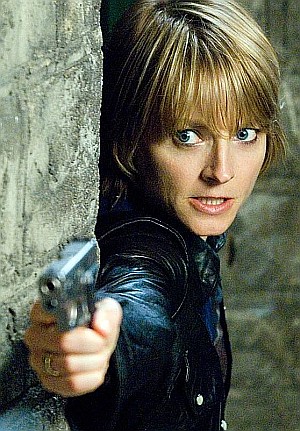 Erica (Foster) has a very comfortable life: nice job as a radio host, imminent marriage to a doctor. This is suddenly destroyed in minutes, when she and her fiance (Andrews) are brutally attacked: he is killed, and she is left a nervous wreck, who sees a threat in every shadow on the city streets. A move to Kansas, while probably better for all concerned, would not be so cinematically or narratively interesting: instead, she buys a black-market gun for protection. A chance encounter on the subway unleashes her inner Bernhard Goetz and before you know it, she’s sweeping the scum off the streets, up to and including the crime lord whom even Detective Mercer (Howard) cannot touch, while simultaneously documenting the city’s reaction to her exploits on the airwaves. This brings her into contact with Mercer, since he is also investigating the vigilante slayings; his suspicions in this area gradually turn towards his new friend.
Erica (Foster) has a very comfortable life: nice job as a radio host, imminent marriage to a doctor. This is suddenly destroyed in minutes, when she and her fiance (Andrews) are brutally attacked: he is killed, and she is left a nervous wreck, who sees a threat in every shadow on the city streets. A move to Kansas, while probably better for all concerned, would not be so cinematically or narratively interesting: instead, she buys a black-market gun for protection. A chance encounter on the subway unleashes her inner Bernhard Goetz and before you know it, she’s sweeping the scum off the streets, up to and including the crime lord whom even Detective Mercer (Howard) cannot touch, while simultaneously documenting the city’s reaction to her exploits on the airwaves. This brings her into contact with Mercer, since he is also investigating the vigilante slayings; his suspicions in this area gradually turn towards his new friend.
There’s obviously, more than an element of Death Wish here, though the heroine here is motivated, at least in part, by more than revenge. Foster is solid, as you’d expect – her character is an interesting parallel [or, in some ways contrast] to those she played in Silence of the Lambs and The Accused, and is hardly Charles Bronson. Jordan cranks up the psychological instability with more dutch angles than any film since Battlefield Earth, but the film is generally restrained, avoiding the more lurid angles, though it possesses a more than pessimistic opinion of the justice system. One does sense more could have been done with the media aspects: the resultant feeding frenzy, with the killer becoming a heroic figure to some, is only brushed against, and nothing much is made of the fact that her attackers videotape their crime. However, it’s still a credible slice of urban paranoia and disfunctionality. In many ways, its closest cousin is, perhaps surprisingly, The Dark Knight: to obtain closure, Erica has to decide, just like Bruce Wayne, how far into the abyss she is prepared to descend…
Dir: Neil Jordan
Star: Jodie Foster, Terrence Howard, Naveeen Andrews, Mary Steenburgen
Juncture
★★★★
“Dead woman walking.”

 Let’s start off by giving us a heroine who is dying, thanks to an inoperable brain tumour. Way to bring me down, Juncture: what do you think this is? DamesWithDiseases.com? The Hallmark channel is tha…oh, hang on. She’s following a child-porn purchaser back to his house, and guns him down? Hmmm. This is clearly not your everyday Illness of the Week flick. For Anna Carter (Blackport) has decided to go out with a bang: several of them, in fact. Realising she only has a short time to live, she decides to extend her day-job as the co-ordinator for a charitable foundation, and correct the failings of a justice system: neglectful mothers, drunk drivers, selfish CEOs, they’re all likely to meet impeccably-dressed vengeance.
Let’s start off by giving us a heroine who is dying, thanks to an inoperable brain tumour. Way to bring me down, Juncture: what do you think this is? DamesWithDiseases.com? The Hallmark channel is tha…oh, hang on. She’s following a child-porn purchaser back to his house, and guns him down? Hmmm. This is clearly not your everyday Illness of the Week flick. For Anna Carter (Blackport) has decided to go out with a bang: several of them, in fact. Realising she only has a short time to live, she decides to extend her day-job as the co-ordinator for a charitable foundation, and correct the failings of a justice system: neglectful mothers, drunk drivers, selfish CEOs, they’re all likely to meet impeccably-dressed vengeance.
While not exactly action-packed – it’s more about the philosophy of violence than the actual execution – and for the most part, thoroughly depressing, it’s a very intriguing and largely successful work. It’s main strength is Blackport, perfectly cast for the role, at first looking like a china doll, emotionless and placid. It’s only gradually that we see the seething mess of contrasting (and largely conflicting) emotions that are inside, since her decision is not something that has come out of thin air. There are some spotty bits of plotting here, noticed by Chris with her laser-guided Script Deficiency Spotter 3000TM. For example, why go after someone buying kiddie-porn, when you could go after someone making it? Some of the other choices of targets seem a little odd, and Anna also makes little effort to cover her tracks: even if she’s dying, she would still presumably want to continue her mission for as long as possible.
 Still, there’s a great deal to admire here, with every penny being squeezed out of the budget. Particular kudos to cinematographer Richard Lerner and composer Neal Acree, whose efforts enhance proceedings significantly – the results look to be the product of a significantly-higher budget, than the rumoured million dollars. It leaves you questioning what you would do in the same situation: follow Queen Latifah off on a Last Holiday, or head for the dark side, as Anna does here, with a mission for what you perceive as the ‘greater good’? Certainly more thought-provoking than usual, it’s intended as the first part on a trilogy, though stands fairly well on its own, I would be very interested to see how things proceed from here, as Anna heads towards closure, both personal and medical.
Still, there’s a great deal to admire here, with every penny being squeezed out of the budget. Particular kudos to cinematographer Richard Lerner and composer Neal Acree, whose efforts enhance proceedings significantly – the results look to be the product of a significantly-higher budget, than the rumoured million dollars. It leaves you questioning what you would do in the same situation: follow Queen Latifah off on a Last Holiday, or head for the dark side, as Anna does here, with a mission for what you perceive as the ‘greater good’? Certainly more thought-provoking than usual, it’s intended as the first part on a trilogy, though stands fairly well on its own, I would be very interested to see how things proceed from here, as Anna heads towards closure, both personal and medical.
[The film was released on August 12 by MTI Home Video. It comes in widescreen, with a director’s commentary and behind-the-scenes footage. More information can be found at MTI’s website, and the film’s official site.]
Dir: James Seale
Star: Kristine Blackport, Jeff Nicholson, Diana Dresser, Andrew Porter
Ms. 45
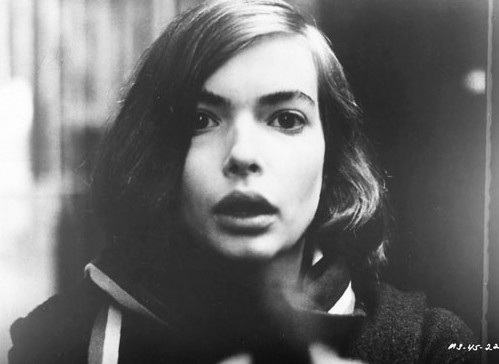 ★★★★★
★★★★★
“Dark Angel.”
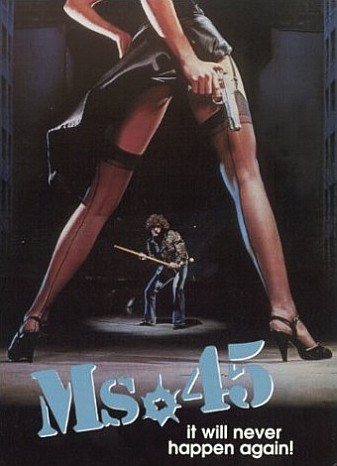
 Abel Ferrara is one of the most interesting of American film-makers, with an uncompromising vision that has seen him almost entirely shut out of mainstream cinema: the closest he’s come to a Hollywood movie was his Invasion of the Body-Snatchers remake, which was a failure on just about every level. Instead, he’s been on the outside, looking in, with films that range from the brilliant to the near-unwatchable. You never know what you’re going to get. It can be something raw and amazing, like Bad Lieutenant, or it can be a garbled, self-indulgent mess, such as his attempt to adapt William Gibson’s New Rose Hotel.
Abel Ferrara is one of the most interesting of American film-makers, with an uncompromising vision that has seen him almost entirely shut out of mainstream cinema: the closest he’s come to a Hollywood movie was his Invasion of the Body-Snatchers remake, which was a failure on just about every level. Instead, he’s been on the outside, looking in, with films that range from the brilliant to the near-unwatchable. You never know what you’re going to get. It can be something raw and amazing, like Bad Lieutenant, or it can be a garbled, self-indulgent mess, such as his attempt to adapt William Gibson’s New Rose Hotel.
Ms. 45 falls firmly into the first category, held together by an amazing, luminescent performance from the then 17-year old Zoe Tamerlis [a.k.a. Zoe Lund], whose character Thana is entirely mute – except for one word, whispered in the final scene. She works in a garment factory, run by sleazy owner Albert (Sinkys): one day, she is raped on the way home. Worse follows, as when she stumbles in to her apartment, another intruder is there, and violates her again. However, with the aid of a convenient domestic appliance, she kills him – and now possesses his gun, with which she can take on, single-handed, the men she now perceives as threats.
As Thana’s mental state disintegrates, however, her action gradually shift away from justified. While the viewer initially sympathizes with her, and cheers her on, it slowly becomes apparent that she has become entirely unhinged, paranoid and delusional. She goes from reaction to pro-action, dressing up and going out with the specific intent of luring men in and killing them. In many ways, Thana ends up worse than those who triggered her rage, spiralling down into what are basically random acts of violence: Tamerlis had, allegedly, been a victim of rape the previous year by a professor at Mount Holyoke College, and did not report it. As Ferrara put it, “Women are brought up in a male dominated society. You’re being raped every day, one way or another. That is the metaphor of the film.”
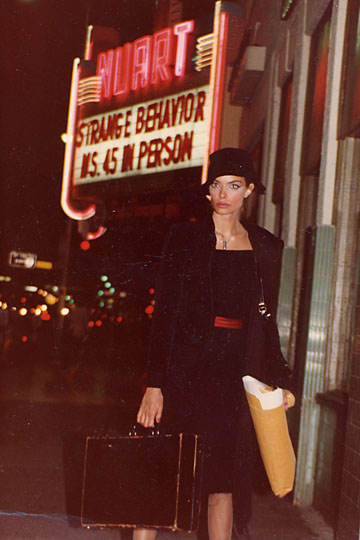 Hmm. While I can acknowledge the political subtext in Thana’s muteness [especially since it appears largely to be psychological, going by the last scene], I’m not quite sure how seriously I take this claim overall, given Ferrara actually plays one of the rapists, and a large percentage of the time is spent objectifying and fetishizing his lead actress, to the extent where Chris felt she looked like a supporting actress in a Robert Palmer video. Perhaps the most memorably instance of this is Thana, dressing up as a nun – but one that also wears stocking and suspenders – before heading out to a Halloween party. With her blood-red lipstick, she kisses each of the bullets before loading them into her gun, a sequence which tells us much about Ferrara’s repressed Catholicism [also apparently rampant in Lieutenant, where both Ferrara and Lund worked on the script], as well as paying homage to the other great New York street-sweeper, Travis Bickle from Taxi Driver.
Hmm. While I can acknowledge the political subtext in Thana’s muteness [especially since it appears largely to be psychological, going by the last scene], I’m not quite sure how seriously I take this claim overall, given Ferrara actually plays one of the rapists, and a large percentage of the time is spent objectifying and fetishizing his lead actress, to the extent where Chris felt she looked like a supporting actress in a Robert Palmer video. Perhaps the most memorably instance of this is Thana, dressing up as a nun – but one that also wears stocking and suspenders – before heading out to a Halloween party. With her blood-red lipstick, she kisses each of the bullets before loading them into her gun, a sequence which tells us much about Ferrara’s repressed Catholicism [also apparently rampant in Lieutenant, where both Ferrara and Lund worked on the script], as well as paying homage to the other great New York street-sweeper, Travis Bickle from Taxi Driver.
Certainly, Tamerlis’s reading of the film is rather different. [Spoiler alert] “No, Ms. 45 is not about women’s liberation, any more than it is about mutes’ liberation, or garment workers’ liberation, or your liberation, or my own. Notice that her climactic victim is not a rapist in the clinical sense. He is her boss. The real rapist. Our real rapist… Ms. 45 presents a humble, yet well-crafted metaphor for rebellion of the any-sexed oppressed. But the gun was put in a woman’s hand. A woman carried that universal message, and so it was all the more powerful. It made us shiver. Male and female. Different timbres and temperatures of shiver, but shiver all round.”
Running counter to that, or perhaps lending it an additional depth, is that the one who stops Thana, in effect betraying her, is one of her own. It’s a woman and a fellow garment worker, her former friend Laurie (Stuto), who stabs her in the back, literally – a metaphor that I’m certain was not accidental, any more than the phallic positioning of the knife at Laurie’s crotch. [End spoilers] The subtext there seems to be that the oppressed can not be trusted to stick together in their battle against the oppressor, even though Laurie is a strong-enough personality in her own way. She certainly has no problem responding in kind to the barrage of verbal harrassment she and Thana suffer as they walk home from work. Our heroine, meanwhile, has ‘victim’ written all over her in the early stages of the film, though the strength she eventually finds and displays, is clearly in a radically different and anti-social direction.
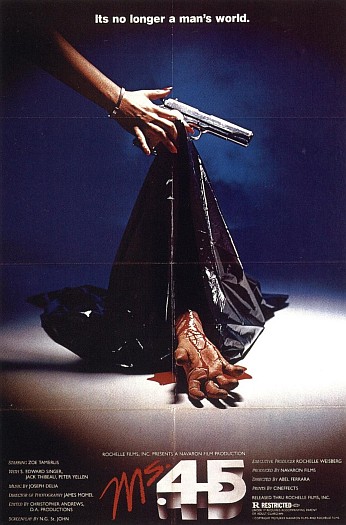 There are certainly holes in the plot logic. Where is Thana getting all the bullets from, and why is she such a crack-shot, despite presumably having never having handled a gun before? Yet these are in step with the pitch-black tongue-in-cheek humour the film contains: witness the long, rambling monologue inflicted on Thana by a guy she meets in a bar [her muteness making her the ultimate good listener]. I laughed like a drain at the sequence where Thana tries to get her landlady’s dog run over in traffic, as its nosiness concerning the severed body-parts round her appartment poses a threat. And when disposing of said parts, there’s surely nothing that you want to hear less, than for someone to shout after you, “Hey, lady! You dropped your bag!”
There are certainly holes in the plot logic. Where is Thana getting all the bullets from, and why is she such a crack-shot, despite presumably having never having handled a gun before? Yet these are in step with the pitch-black tongue-in-cheek humour the film contains: witness the long, rambling monologue inflicted on Thana by a guy she meets in a bar [her muteness making her the ultimate good listener]. I laughed like a drain at the sequence where Thana tries to get her landlady’s dog run over in traffic, as its nosiness concerning the severed body-parts round her appartment poses a threat. And when disposing of said parts, there’s surely nothing that you want to hear less, than for someone to shout after you, “Hey, lady! You dropped your bag!”
Chris, who lived in the Big Apple during the early-80’s, can also attest to the attitudes and dialogue as being authentic Noo Yawk, and the film does an excellent job of portraying the city as a predatory jungle, with a threat lurking behind every corner, especially for someone as attractive as Thana. Of course, “threat” is relative, and by the end, our heroine is the biggest threat – albeit only to those with a Y-chromosome, and the question of whether they deserve it or not is, to some degree, debatable. Still, in the words of the great philosophers, Paul Cook, Steve Jones and Ronny Biggs, “No-one is innocent.” Particularly in these days of movies produced by bean-counters, it’s refreshing to see a film that eschews a black-and-white approach in favor of an arc that takes us with a character as they journey into somewhere very dark and unpleasant, without needing to resolve things in a manner best described as, “…and they all lived happily ever after.”
[The pics and quotes here largely come from zoelund.com, a tribute site apparently run by Zoe’s ex-husband.]
Random notes
- Tamerlis used to show up to some screenings of the film [above, outside the Nuart theater in Los Angeles] and discuss the social and political implications of the movie afterwards with the audience.
- Which must have been interesting, as even the grindhouse theaters that were the movie’s natural home found it difficult viewing. In Cult Movies 2, Danny Peary says of the film, “Never has a 42nd Street theater been so quiet and disciplined as when Thana went through her rounds and murdered every offensive male who crossed her path… Unexpectedly, the men who had whooped all through Amin and the obscenely gory previews of Dr. Butcher, whimpered worrisomely “Oh, my God” and slumped in their seats and shut up.”
- It’s still unavailable in the United Kingdom except in a version where the rape scenes are cut by one minute, 42 seconds. Even the 2000 US DVD was re-edited: the cuts include changes to the first rape featuring Ferrara’s cameo, which is split by an insert shot from a later scene, the second rape omits a line “This oughta make you talk, huh?” and the climatic shoot-out removes an on-screen murder, which now occurs off-screen.
- The film inspired a song by L7, with the same title: “She’s got a gun, just make her day: don’t fuck with her, she’ll blow you away. She walks the streets at night and they think she is a whore. She’s gotta deal with you – she’s gonna even out the score.” The less well-known Dandi Wind also wrote a song called Ms. 45: “Today I bought a gun, Now I’m dressed just like a nun.”
- “According to Tamerlis, her performance in Angel of Vengeance provoked a sniper attack on her in New York, wounding her.” — 1983 Virgin Film Yearbook
- While Tamerlis experienced some success as a screenwriter and actress [Larry Cohen’s Special Effects is certainly worth checking out], she was a long-time drug user first of heroin and then cocaine. This contributed to her death of heart failure in Paris, in 1999.
Dir: Abel Ferrara
Stars: Zoe Tamerlis, Albert Sinkys, Darlene Stuto, Helen McGara
a.k.a. Angel of Vengeance




